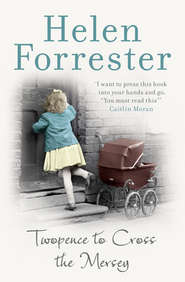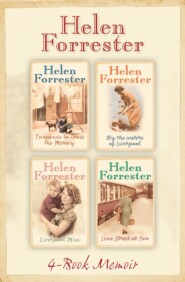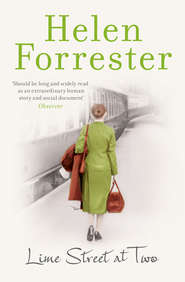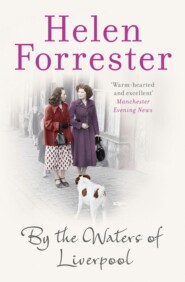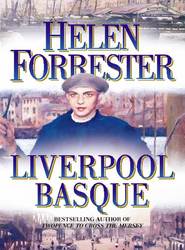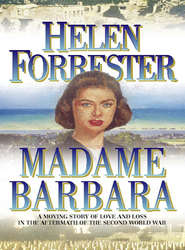По всем вопросам обращайтесь на: info@litportal.ru
(©) 2003-2024.
✖
Liverpool Miss
Настройки чтения
Размер шрифта
Высота строк
Поля
‘But must I always stay at home, Mummy? I’m over fourteen now. I should be at work – like other girls are. Couldn’t we find someone to help out at home?’
‘Really, Helen. Be sensible. How could we afford to pay anyone?’
We did need the money, it was true, and we never paid anybody we could avoid paying but I had all the adolescent’s doubts about my elders, and I distrusted Mother’s motives. There had never been much love between us. I had always been taken care of by servants; in fact, Mother had never had to take complete care of any of her children. I sensed angrily that she found it easier to go out to work than to stay at home and face the care of seven noisy children. I found coping with six brothers and sisters, who daily became less disciplined, very hard indeed.
So, as I walked through the rain along Castle Street and absent-mindedly played with Baby Edward, and diverted Avril’s attention to Minerva and then to a warehouse cat stalking solemnly across the street, I was bitterly unhappy.
We had to stop, while a desk was carried across the pavement from a furniture van into an office building; and I looked again up at Minerva.
She seemed almost to float in the misty rain, and I wondered suddenly if something more than a statue was really there, some hidden power of ancient gods that we do not understand, and I said impulsively, ‘Hey, Minerva. Help me – please.’
The big man in a sacking apron, who was supervising the transfer of the desk, turned round and asked, not unkindly, ‘Wot yer say, luv?’
I blushed with embarrassment. I must be going mad with all the strain. I’m crazy.
‘Nothing,’ I said hastily. ‘I was just amusing the baby.’
‘Oh, aye,’ he replied, smiling down at Edward, while the desk disappeared through a fine oak doorway. ‘You can get by now, luv.’
Two (#ua616dba6-bd8c-573b-83e6-91d4afdb36d0)
I was twelve when we first came to Liverpool, and my parents were able to keep me at home because the Liverpool Education Committee did not know of my existence. I had come from another town and did not appear in any of their records. Six weeks before my fourteenth birthday my presence in Liverpool was reported by my sister, Fiona’s, school teacher. And much to my parents’ annoyance, I had to attend school for those six weeks.
Now I was over fourteen, my parents had no further legal obligations in respect of my education. So, at home I stayed, simmering with all the fury of a caged cat.
I had had an aunt, a spinster, kept at home all her life to be company to my grandmother, who lived on the other side of the River Mersey. This aunt seemed to have no real life of her own, and I dreaded being like her, at the beck and call of my relations, a useful unpaid servant, without the rights of a servant. She was such a shadow of a person that I never ever thought that she might help me.
I raged to myself that I was always the last to be provided with food and clothing. I did not even think about the lack of pocket money or other small pleasures – they were beyond my ken.
In our hard-pressed family, shoes and clothing were given first to those who had to look neat for work, and then to those who went to school. I could always manage because I did not have to go out, I was told sharply.
As housekeeper, I had to apportion the food. I fed Baby Edward first, then Avril, who was nearly five, then the two little boys, Brian and Tony. After them, frail, lovely Fiona and cheery Alan. I would then serve Father, who never complained about the small amount on his plate. What was left was shared between Mother and me. Sometimes there were no vegetables left for us, and frequently no meat, so we had a slice of bread each, with margarine, washed down with tea lacking both sugar and milk.
Mother still looked so dreadfully haggard that I would sometimes say, with a lump in my throat, that I was not hungry and would press the last remaining bits of meat and vegetable upon her. All my life I had been afraid of her tremendous temper, but such fear had long been overridden by a greater fear that she might die.
In response to my frequent complaints at not being allowed to go to work, Mother often said absently, ‘Later on, you will marry. Staying at home is good practice for it.’
But I had always been assured by Mother and the servants that Fiona had the necessary beauty to be married; and I – well, I did have brains.
‘You can’t help your looks,’ our nanny, Edith, used to say, as she scrubbed my face. ‘Maybe your yellow complexion is from being ill so much. It might improve as you get older.’ She used to seize a brush and scrape back my straight, mousy hair into a confining ribbon bow on the top of my head; but she spent ages curling Fiona’s soft waves into ringlets.
‘Why do you have to be so disobedient? You’re nothing but a little vixen, you are. Nobody’s going to marry a faggot like you when you grow up,’ she would shout exasperatedly. ‘Get those muddy shoes off, before I clout you.’
In a desperate effort to save myself from spinsterhood, I learned to obey a raised voice like a circus dog. But it did not do me much good. I was still sallow and plain, sickly and irritable.
After Father found a job, I fought a great battle with my parents for permission to attend night school three evenings a week. It became the single joy of my life. There was order and purpose in the musty, badly-lit classrooms with their double wooden desks in which, for most classes, sat more than forty pupils. The bare board floors, the faded green paint and chipped varnish were much more pleasant and clean than my home.
For the first two winters of my attendance, nobody would sit by me, because I was so blatantly dirty and I stank. Only the teachers spoke to me. In some subjects I was so behind that I needed dedicated helpers. And the teachers gave me that help.
The bookkeeping teacher taught me the simple arithmetic which I had forgotten through long absence from school. The English teachers gave me essays to write, in addition to the business letters they demanded from their other pupils. They drew my attention to poems and to essays I should read. Later, I took German and French, and again the teacher drummed additional grammar into me, and introduced me to the translated works of foreign authors. Shorthand, a possible gateway to employment, was largely a matter of practice, and I practised zealously.
I dreamed of becoming the treasured secretary of some great man of affairs, like Sir Montague Norman, the Governor of the Bank of England, to whom I had once been introduced. He had given the silent, small girl by Father’s side a new shilling, and I had curled up in an agony of shyness and refused to say thank you, much to Father’s embarrassment. But, of course, when I became a secretary, I would always be ready with the correct, polite remark and flawlessly typed letters ready to be signed.
During the day, as I walked little Edward in the squeaky Chariot and, particularly after my more trying charge, Avril, had joined her brothers and sister at school, I read books balanced on the pram’s raincover. I discovered Trevelyan’s histories and read all those that the library had. The librarian suggested histories of other countries, so I read, not only the histories of France and Germany, but those of China and Japan, of the United States and of the countries of South America.
The heroines of some of the Victorian novels I read studied philosophy in their spare time, so I plodded through the works of several German philosophers far too difficult for me.
‘Don’t know what they are talking about,’ I told Edward crossly.
I found a book by Sigmund Freud and decided that he did not understand females at all. And what was it that people were supposed to be repressing all the time? Men behaved like men and women behaved like women. How could they behave any other way other than by being natural?
I tied myself up in mental knots, considering Freud, and never associated his work with the strange spasms and longings in my own maturing body. To my mind, Freud did not seem to do so well at interpreting dreams as Joseph in the Bible did.
Beneath this rabid desire for an education, for knowledge, simmered a mixture of fear and rage: I felt my parents did not really care what happened to me, as long as I continued to serve them.
Three (#ua616dba6-bd8c-573b-83e6-91d4afdb36d0)
Despite our big family, I suffered great loneliness. When Father was not too tired he would sometimes talk to me about his wartime experiences in Russia or we would discuss eighteenth-century France, of which he had a considerable knowledge. Mother ordered; she did not discuss. Without pen, ink, paper or stamps, I could not write to the school friends I had left behind in my earlier life. In fact, at first my parents refused obdurately to allow me to write.
‘Why not?’ I demanded crossly.
‘Because it costs money, and there may be some creditors who still want to trace your Father.’
They also forbade me to write to my grandmother, Father’s mother, with whom I had always spent several months of each year. Grandma, Father said, had been most unreasonable and he had quarrelled with her. I suspected that she had finally grown tired of the scandals of the gay life my parents had led before the Depression, and then of helping to pay their debts.
When I went to the local shops, I saw only older, married women, or children sent on messages, and, to me, some of the girls who lived in neighbouring streets seemed hardly human. On Saturdays and Sundays they went about in twos and threes, dressed in cheap finery. They gawked and giggled and shrieked at the gangling youths hanging uneasily about the street corners. Because their labour was very cheap, these girls had work in stores and factories. Once they were sixteen years old they usually joined their unemployed brothers.
Sometimes, when I passed a group of them as I pushed Edward along in the Chariot, they stared and laughed at me behind their hands. Garbed in the tattered remnants of my school uniform, occasionally with no knickers under the short skirt, I had to walk very uprightly lest a bare bottom be revealed to them. Once or twice they shouted at the idling boys to inquire which of them had ‘caught’ me. It was a long time before I realised that it was generally assumed that Edward was my illegitimate child. When I did discover it, I cried with mortification, because I knew that to have a baby out of wedlock was very wicked.
I was very vague about the origins of babies. I did not think about it very much. Dimly, uncertainly, I imagined that they came from the same place as foals and lambs and calves did. But I had never actually seen a birth and how this could be was beyond my imagining. I never equated men with stallions, rams or bulls. But, to be respectable, a child had to have a visible father or a substitute, like a gravestone, to account for his absence – that I knew. Once, when I was small, Mother dismissed our parlourmaid without a moment’s notice, and I knew from the maids’ gossip that she was expecting a baby – and she was not married.
Occasionally, when Edith was angry she would hiss savage remarks about my parents’ lack of feeling, and quote this incident as an example of it. The housemaid left us shortly afterwards, in protest, according to Edith. Edith herself stayed with us until we left the district, because she was engaged to a young farmer nearby; and I clung to her as a mother substitute. She was a plump, comfortable country girl with rosy cheeks and fluffy, long brown hair, and was downright in her speech. I never doubted anything she said.
I had only two close contacts to assuage this sense of isolation. One was a very old interpreter, who sometimes sat in Princes Park to sun himself. We talked a lot about the Middle East and about other languages, as I sat and supervised the children’s play. One day he was missing from his usual seat and never came again. I presumed he had died and had gone to join his wife and two sons. The boys had been killed in the war and he grieved for them.
The other friend was a Spanish woman named Cristina. She and her husband, Alonzo, lived in the basement of the house next door to that in which we had originally rented an attic. Her children were all grown up and had left home. She was extraordinarily kind to Edward and me, and it was she who had given us the Chariot in which I wheeled Edward and Avril around.
In my position as surrogate mother, I had neither time nor opportunity to play. As the children became rougher and, in order to survive, became more like the other boys and girls in the district, the gulf widened between us and there seemed to be no close communication. Even Alan, so close to me in age, was to me a child; I did not worry him with details of our empty pantry.
Because I did not have a shopping bag, the greengrocer used to wrap up potatoes and other vegetables in newspaper for me, and when I arrived home I used to read these papers. There were descriptions of local tennis tournaments amongst young people, and stories of balls and receptions. I would stand dreaming with the muddy paper in my hands, imagining myself scampering about a tennis court delivering serves that raised cheers from the onlookers; or I would think how lovely it would be to skim around a ballroom in a billowing net dress. And how good it would be to go to the theatre again. In me were the stirrings of womanhood, though I did not understand them, and I had an instinctive desire to be clean, to be prettily dressed, to hide as much as possible the ugliness which I had been assured was mine.
When I thought about it, I became so afraid of the friendless, empty future, that sometimes my legs would begin to give under me, and I would have to stop walking and cling to the pram handle until the sense of blind panic passed.
Four (#ua616dba6-bd8c-573b-83e6-91d4afdb36d0)
Mother worked on short contracts in the bigger city department stores. She demonstrated new products, like kitchen gadgets, or was engaged especially to sell slow-moving goods that might deteriorate if kept in stock too long. She slowly gained a good reputation, and stores would pass her from one to another, to get rid of piles of baby baths in unpopular colours, baby clothes that threatened to harbour moths, cameras and photographic supplies left over from the summer season, and the newest wringer washers and gas stoves.
She became an excellent saleswoman, and it used to amuse me to carry Edward into a shop and watch her demonstrate the use of a gadget. It fascinated me to observe how she could beguile housewives into impulsive purchases.






